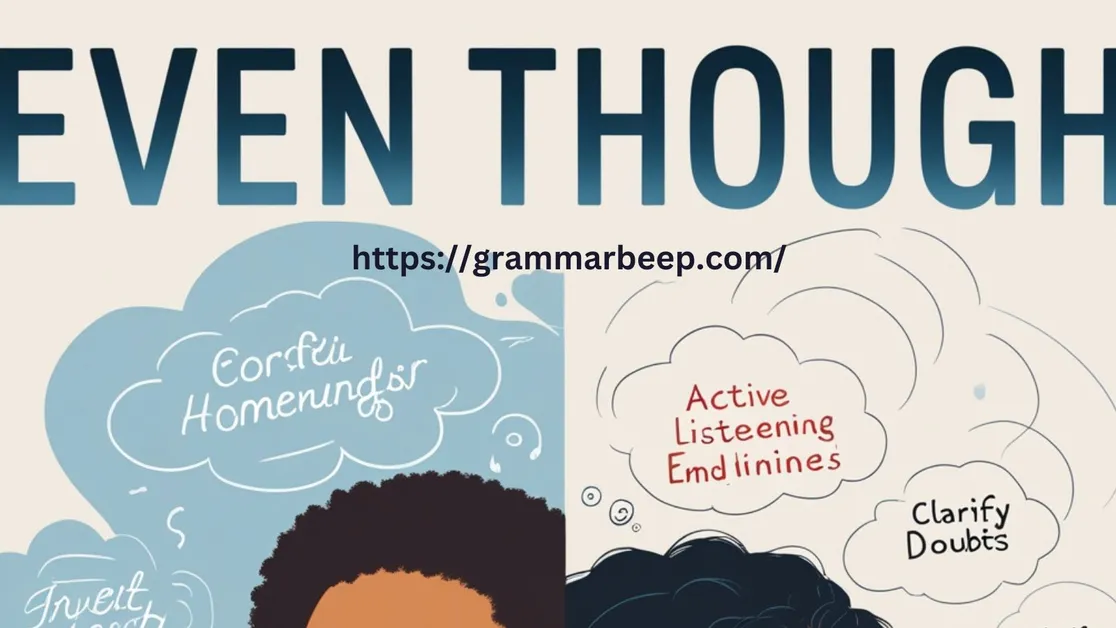20 Other Ways to Say “Even Though” gives your writing the power to stand out with clarity and style. Using the same phrase again and again can sound dull or robotic. That’s why knowing how to express contrast in different ways makes your writing feel fresh, smart, and more natural.
This article brings together powerful synonyms for even though with real-world examples like emails and stories. You’ll learn how to apply contrasting conjunctions that match tone, purpose, and style—whether you’re writing in a casual setting or crafting a professional tone. It’s all about using the right phrase at the right time.
Although
“Although” is one of the most direct synonyms for even though. It introduces a concessive clause, showing that something happened despite another condition.
Example Email:
Subject: Friday’s Meeting
Hi Clara,
Although the forecast predicts rain, I’d still like to have our team picnic outdoors. I’ll bring extra umbrellas just in case.Cheers,
Jake
This is ideal in both formal and informal settings, making it a go-to contrastive transition word.
Though
“Though” is a more casual cousin of “although.” It’s great in spoken English, and can even appear at the end of a sentence, giving it a natural rhythm.
Scenario: Casual Conversation Email
Hey Ben,
That new burger place was packed! We got a table, though, and the food was worth the wait.See you Saturday!
–Sophie
The differences between although and though are subtle, but “though” often feels a bit looser and more conversational.
Whereas
“Whereas” is used to directly contrast two things. It works best in formal writing or when comparing opposing viewpoints.
Example: Internal Report
The marketing team prefers in-person brainstorming, whereas the design team thrives in remote settings.
This is an excellent tool when comparing opposing views with clarity and balance.
Check out this: 22 Ways to Say “Enjoy Your Lunch”
While
“While” can mean two things: simultaneity or contrast. In this context, we’re focusing on its use as a concession conjunction.
Example Email:
Hi Laura,
While I understand your hesitation, I believe this campaign is our best shot at reaching Gen Z customers.Let me know what you think.
–Arjun
In professional tone emails or academic writing, “while” strikes a perfect balance.
Nevertheless
“Nevertheless” is a punchy, stylish way to flip the conversation. It’s a transitional adverb that signals an unexpected outcome.
Example: Company Memo
The app experienced several glitches. Nevertheless, user retention increased by 8% last quarter.
It fits beautifully into formal contexts where a bold turn of logic is needed.
Despite the Fact That
This phrase adds a layer of emphasis, making the contradictory statement stand out. It’s a bit more formal and useful in technical or academic documents.
Example: Project Update Email
Hi Priya,
Despite the fact that we extended the deadline, several teams still missed the submission window.We may need to revise our workflow.
–Max
This structure is ideal for writing contrast in English when precision matters.
More for you: 27 Other Ways to Say “Enjoy Your Vacation”
While
In Spite of the Fact That
Closely related to the previous one, but with slightly more dramatic flair. Perfect for literary writing or reflective tone.
Example: Short Story Excerpt
In spite of the fact that she had never danced before, Mira took the stage with confidence and grace.
It emphasizes perseverance or a surprising turn, lending itself well to creative writing tone.
Albeit
“Albeit” is compact and classy. It introduces a slight concession or exception in a concise way.
Example Email:
Hi Diego,
The conference was engaging, albeit a bit long. Still, I made some great contacts.Cheers,
Tasha
It fits seamlessly into words for academic writing and other polished prose.
Yet
Simple, direct, and powerful. “Yet” is often used when you want to express strong contrast in just one word.
Example: Personal Blog Post
I had no map or plan, yet I found myself exactly where I needed to be.
Its brevity makes it one of the most efficient sentence connectors in English.
However
“However” is a cornerstone of transition words. It sets up a pivot—telling the reader, “Wait, there’s more to this story.”
Example: Business Email
Hi Team,
Sales dipped slightly in May. However, June projections remain strong thanks to our new campaign.Let’s keep the momentum going.
–Natalie
It’s one of the most common linking ideas in writing transitions and works well in all contexts.
For your interest: 19 Other Ways to Say “Can’t Wait”
On the Other Hand
Used when comparing two alternatives, “on the other hand” presents a second, opposing idea.
Example: Job Offer Comparison Email
Hey Malik,
The startup offers more creative freedom. On the other hand, the agency provides long-term stability.
It’s a classic choice when exploring language for expressing contrast between options.
Conversely
“Conversely” is slightly more formal and academic-sounding. It introduces a mirror-opposite perspective.
Example: Research Summary
Most participants preferred remote work. Conversely, older respondents felt more productive in the office.
A natural fit for scholarly papers or English grammar structures that demand precision.
Notwithstanding
A bit old-fashioned, but full of charm. “Notwithstanding” works like “in spite of” but adds a literary flair.
Example: Fictional Narrative
His face was bruised and tired. Notwithstanding, he stood with quiet dignity.
Perfect for literary writing and creative metaphors.
Even If
“Even if” suggests a hypothetical contrast. You’re saying something would be true regardless of a condition.
Example: Motivational Email
Hi Elena,
You’ve put in the work. Even if the pitch doesn’t go perfectly, you’ll have made an impression.Best of luck,
Greg
It introduces opposing ideas in a supportive or empathetic tone.
Still
“Still” feels natural in conversation and informal writing. It’s a way of saying, “Yes, but…”
Example: Text Message
That movie was three hours long. Still, I’d totally watch it again.
An excellent pick for casual settings or dialogue writing.
Though…Yet
Using both “though” and “yet” together adds emphasis to the contradiction.
Example: Character Dialogue
Though it was storming outside, yet he felt strangely calm.
Ideal for dramatic effect in narratives or monologues.
You might also like: 20 Other Ways to Say “Thank You for Your Suggestion”
Even Then
“Even then” emphasizes that despite everything, a truth remains.
Example: Diary Entry
They warned me about the cold. Even then, I wasn’t prepared for how it would feel.
It hints at regret, realization, or reflection.
But Still
This is a bit more colloquial than “nevertheless,” but it carries the same vibe. It’s more likely to pop up in emails or casual essays.
Example Email:
Hey Aaron,
I know you’re swamped. But still, I’d appreciate a quick review if you can manage.Thanks!
–Leslie
This combo softens the request while showing understanding of the situation.
Be That as It May
A formal, somewhat poetic expression meaning, “Even so.” It’s often used when acknowledging a fact, but continuing with a different viewpoint.
Example: Public Speech
The data shows a slight decline. Be that as it may, our long-term outlook remains positive.
Great for speeches, presentations, or formal language for writing.
Though It May Seem
This expression sets up a contradictory statement based on perception versus reality.
Example: Feature Article
Though it may seem counterintuitive, waking up earlier can actually help night owls feel more energized.
Useful when presenting surprising facts or unexpected outcomes.
Synonyms for “Even Though”
| Expression | Tone/Use Case | Example Context |
|---|---|---|
| Although | Neutral/Formal | Emails, essays |
| Though | Casual/Conversational | Chats, blog posts |
| Whereas | Formal/Comparative | Reports, analysis |
| While | Formal but soft | Business writing |
| Nevertheless | Formal/Transitional | Reports, proposals |
| Despite the fact that | Emphatic/Formal | Academic or technical writing |
| In spite of the fact that | Emphatic/Dramatic | Storytelling |
| Albeit | Concise/Formal | Academic papers |
| Yet | Brief/All-purpose | Dialogue, narratives |
| However | Transitional/Formal | Reports, emails |
| On the other hand | Comparative | Options discussion |
| Conversely | Logical/Formal | Academic, contrast essays |
| Notwithstanding | Literary/Formal | Fiction, speeches |
| Even if | Hypothetical | Motivational writing |
| Still | Casual | Reviews, blog entries |
| Though…Yet | Dramatic | Poetry, monologues |
| Even then | Reflective | Diaries, essays |
| But still | Conversational | Emails, letters |
| Be that as it may | Formal/Neutralizer | Public speaking |
| Though it may seem | Analytical/Reflective | Journalism, research summaries |
FAQs
What is the most casual alternative to “even though”?
Though is one of the most casual and commonly used alternatives in everyday conversations.
Can I use “albeit” at the beginning of a sentence?
No, “albeit” usually appears in the middle of a sentence and cannot start one.
Is “whereas” only used for contrast?
Yes, “whereas” specifically shows contrast between two ideas, especially in formal writing.
Which alternative is best for persuasive writing?
Nevertheless adds a strong, persuasive tone when emphasizing unexpected outcomes.
Can “yet” be used in academic writing?
Yes, but use “yet” with care; it’s better in concise sentence structures or combined with formal language for writing.
Conclusion
20 Other Ways to Say “Even Though” helps you level up your language and avoid sounding repetitive. With the right conjunctions and transition words, your writing becomes smoother and more engaging.
These phrases show you ways to express contrast naturally, whether in business, school, or daily conversation. By mixing them in smartly, you bring out the meaning and flow of your message with ease. Strong writing begins with strong sentence connectors.

Zoey Alba is an experienced blogger and language enthusiast with a passion for helping readers master the art of grammar. With years of expertise in writing, editing, and content creation, Zoey shares practical tips and insightful advice to make grammar accessible for all. When she’s not writing, Zoey enjoys reading, learning new languages, and inspiring others to write with confidence.
